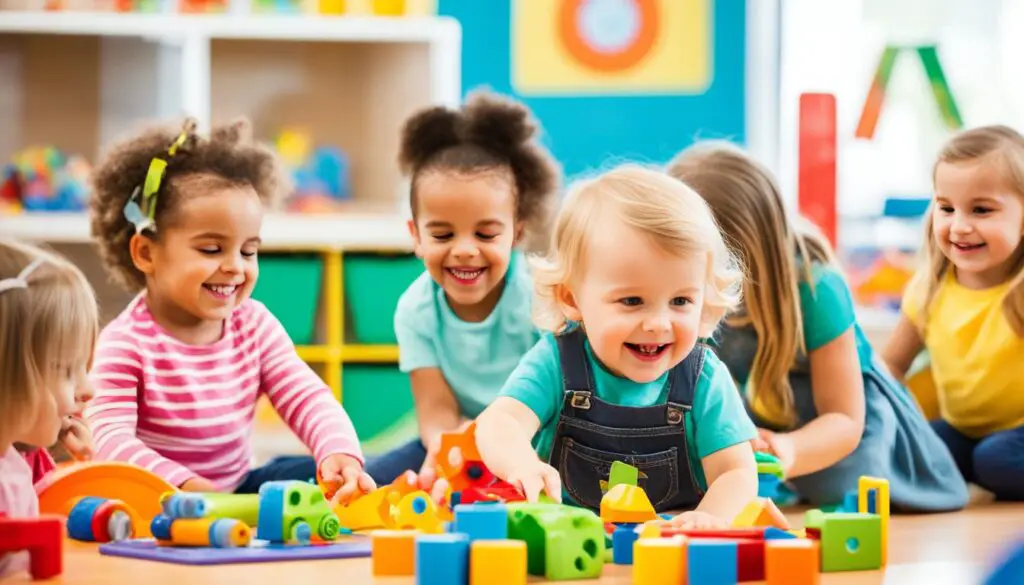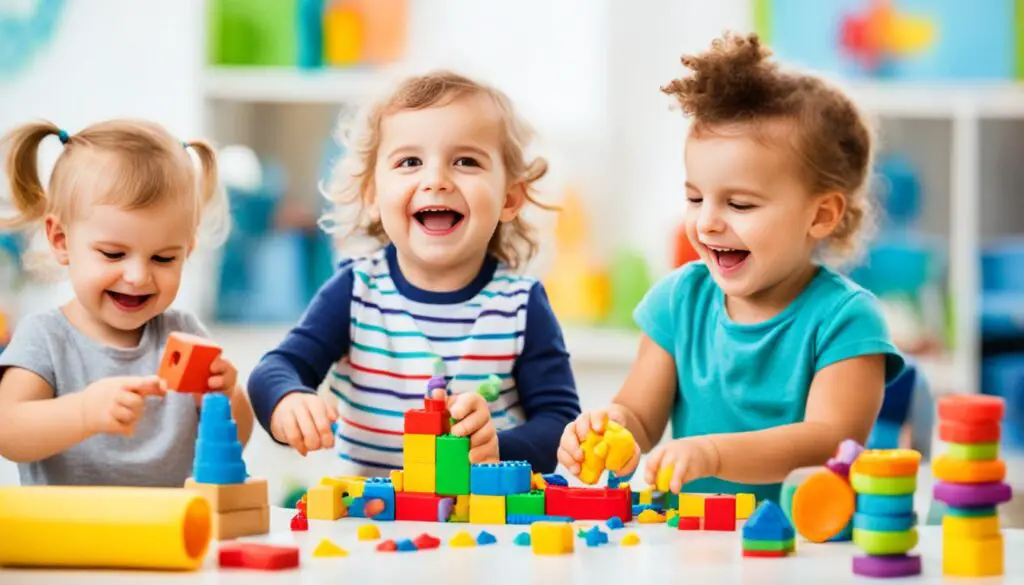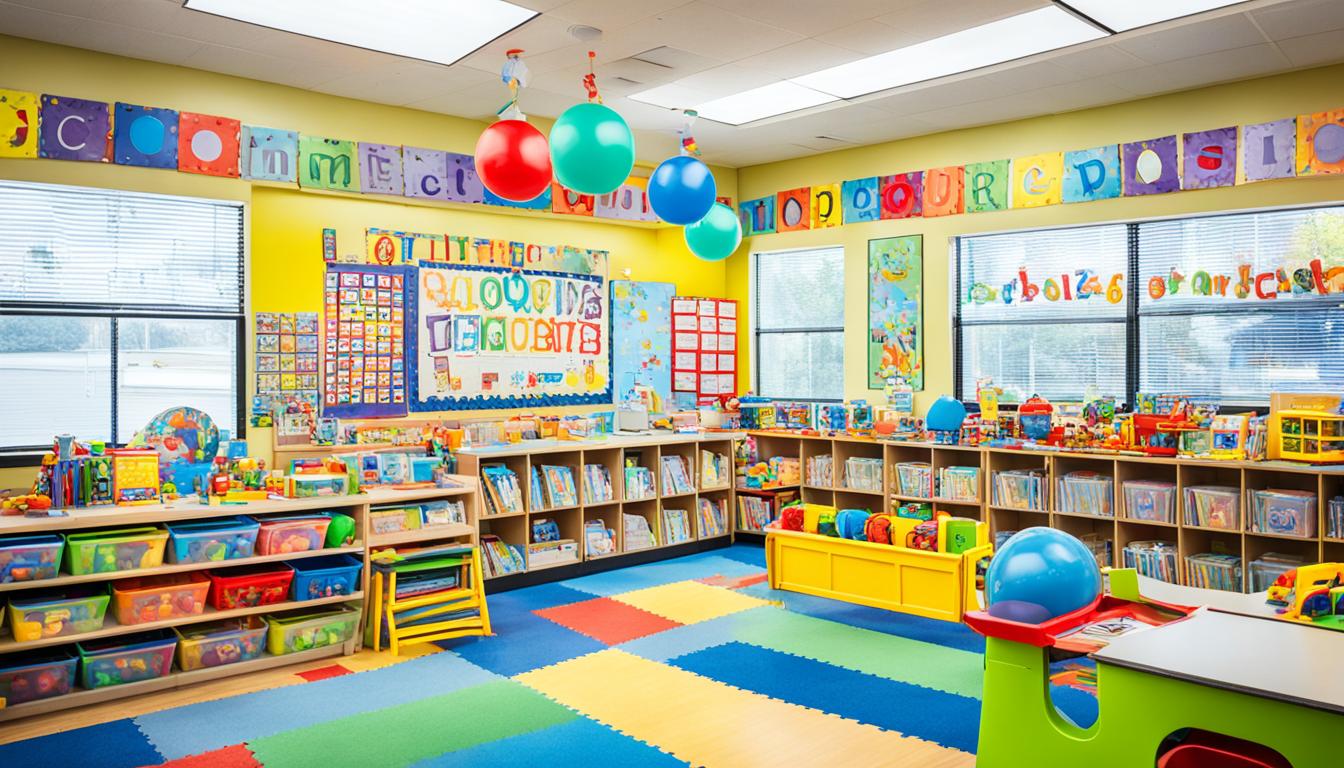The Fundamentals of Early Childhood Education: A Starter Guide
Early childhood education plays a crucial role in laying the foundation for young learners in the US. It provides the necessary support and guidance that children need during their formative years. In this starter guide, we will explore the fundamentals of early childhood education, including its importance, key components, and best practices. By understanding these key aspects, educators and parents can create a nurturing and effective learning environment for children.
Key Takeaways:
- Early childhood education is vital for the overall development of children.
- Quality early education leads to academic success and the development of social skills.
- A comprehensive curriculum and play-based learning are crucial components of early childhood education.
- Early childhood education promotes cognitive, physical, and social-emotional growth.
- Implementing best practices such as individualized instruction and parental involvement enhances the learning experience.
The Importance of Early Childhood Education
Early childhood education plays a pivotal role in the overall development of children. Research has consistently shown that quality early education has a profound impact on children’s academic success and social skills. It serves as a strong foundation for future learning and sets the stage for lifelong achievements.
When children engage in meaningful and developmentally appropriate activities during their early years, they experience significant cognitive, physical, and social-emotional growth. This holistic approach to education ensures that children receive comprehensive support in all areas of their development.
“Early childhood education is not just about teaching children; it’s about nurturing their innate curiosity and eagerness to learn, providing them with the skills and knowledge they need to thrive in school and beyond.”
By fostering a nurturing and stimulating environment that encourages exploration and discovery, early childhood education promotes intellectual curiosity and critical thinking. It equips children with the necessary tools to excel academically, laying a solid foundation for their future educational endeavors.
Furthermore, early childhood education promotes the development of essential social and emotional skills. Through interactions with peers and skilled educators, children learn how to navigate social situations, develop empathy, and build meaningful relationships. These skills are crucial for fostering positive interpersonal connections and future success in various aspects of life.

Research has consistently shown that the benefits of early childhood education extend far beyond the early years. Children who receive quality early education are more likely to perform well academically throughout their educational journey and have higher rates of high school graduation and college enrollment.
Investing in early childhood education not only benefits individual children but also has a positive impact on society as a whole. It leads to reduced crime rates, improved health outcomes, and increased economic prosperity. Therefore, supporting and prioritizing the availability and accessibility of early childhood education is instrumental in fostering a thriving and prosperous society.
The Power of Early Childhood Education: Key Findings
“Studies have consistently demonstrated that children who experience high-quality early childhood programs are more likely to have better educational, social, and economic outcomes throughout their lives.”
-National Association for the Education of Young Children (NAEYC)
| Benefits of Early Childhood Education | Statistics |
|---|---|
| Improved Academic Performance | Children who receive quality early education are more likely to perform well academically, with increased reading and math skills. |
| Enhanced Social Skills | Early childhood education fosters the development of social skills, including empathy, sharing, and cooperation. |
| Reduced Achievement Gap | Participation in high-quality early childhood programs has been shown to narrow the achievement gap between disadvantaged children and their more privileged peers. |
| Long-Term Economic Benefits | Investments in early childhood education yield a high return on investment, resulting in future economic stability and productivity. |
Key Components of Early Childhood Education
Early childhood education incorporates various components that are essential for a well-rounded learning experience for young children. Let’s explore these key components that play a crucial role in shaping their educational journey.
The Curriculum: Fostering Play-Based Learning
A comprehensive curriculum forms the backbone of early childhood education. It is designed to engage children through play-based learning, allowing them to explore, discover, and learn in a hands-on and interactive manner. Play-based learning not only enhances children’s cognitive development but also nurtures their creativity, problem-solving skills, and social abilities.
Promoting Social-Emotional Development
Another vital component of early childhood education is the promotion of social-emotional development. By fostering positive relationships, teaching empathy, and providing ample opportunities for social interaction, educators can help children develop important social skills. This includes communication, collaboration, self-regulation, and conflict resolution, which are crucial for their overall well-being and future success.

An Integrated Approach
Early childhood education recognizes that children are unique individuals with diverse strengths, interests, and learning styles. To cater to their individual needs, an integrated approach is adopted, incorporating various teaching strategies, methods, and resources. This approach ensures that children receive a personalized learning experience that fosters growth across different domains, including cognitive, physical, social, and emotional development.
“The early years of a child’s life are the foundation for all future development and learning. By fostering a curriculum that encourages play-based learning and promoting social-emotional development, early childhood education sets the stage for lifelong learning and success.”
Educator-Child Relationships
Strong relationships between educators and children are at the core of early childhood education. Educators play a crucial role as facilitators, mentors, and guides, creating a safe and nurturing environment where children feel supported and valued. Building trust and rapport with each child fosters positive learning experiences and enhances their overall growth and development.
Collaboration with Families and Communities
In early childhood education, collaboration with families and communities is highly valued. Recognizing the important role played by parents/guardians and the local community, educators strive to build strong partnerships. This collaboration ensures that the child’s learning and development are supported both within the educational setting and in their everyday lives. It also strengthens the connection between home, school, and the wider community.
Continuous Assessment and Reflection
Early childhood education embraces continuous assessment and reflection as part of the learning process. Ongoing evaluation of children’s progress allows educators to tailor their instruction to meet individual needs and provide targeted support. Reflection on teaching practices helps educators adapt and improve their methods to ensure the best possible outcomes for children.
By incorporating these key components into early childhood education, educators create an environment that promotes holistic development, fosters a love for learning, and prepares children for a successful educational journey ahead.
Best Practices for Early Childhood Education
Implementing best practices in early childhood education is key to ensuring the optimal learning experience for young children. One of the most effective approaches is individualized instruction. By recognizing that each child has unique needs, educators can provide targeted support and challenges that cater to their specific strengths and areas for growth. This personalized approach fosters a sense of confidence and motivation, promoting a love for learning in every child.
Parental involvement is another crucial aspect of early childhood education. When parents actively participate in their child’s education, it creates a strong partnership between parents and educators. This collaboration establishes a supportive and nurturing environment both at home and in the classroom. By working together, parents and educators can align their efforts and reinforce learning objectives, leading to enhanced academic and social-emotional development.
Ongoing assessment and monitoring play a vital role in early childhood education. Regularly assessing children’s progress allows educators to track their development and identify areas where additional support may be needed. It also enables educators to make necessary adjustments to their teaching strategies, ensuring that instruction remains effective and tailored to the individual needs of each child. Ongoing assessment provides valuable insights into a child’s growth and guides educators in making informed decisions about curriculum and instructional methods.
By following these best practices, early childhood education can truly make a positive impact on children’s development and future success. Individualized instruction, parental involvement, and ongoing assessment work together to create a nurturing and engaging learning environment that supports the holistic growth of young children. By prioritizing these practices, educators and parents can provide the best possible foundation for lifelong learning and achievement.
FAQ
What is early childhood education?
Early childhood education refers to the educational programs and activities designed for young children, typically from birth to age five. It focuses on providing a nurturing and stimulating environment to promote their overall development and prepare them for future learning.
Why is early childhood education important?
Early childhood education plays a crucial role in the development of children. It lays the foundation for their academic success and helps them develop important social and emotional skills. Quality early education has been shown to have long-term benefits and can positively impact children’s future success.
What are the key components of early childhood education?
The key components of early childhood education include a comprehensive curriculum that emphasizes play-based learning. It also focuses on promoting social and emotional development through fostering positive relationships and providing opportunities for social interaction.
What are the best practices for early childhood education?
Best practices in early childhood education include individualized instruction that meets the unique needs of each child. Parental involvement is also important, as it creates a strong partnership between parents and educators. Ongoing assessment and monitoring help track children’s progress and ensure effective teaching strategies.





